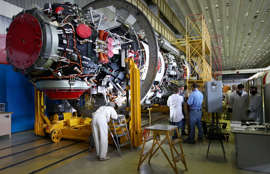Module “Science” of the Russian Segment of the International Space Station
Moscow. The 21st of April. INTERFAX.RU – The “Science” module, which will be sent to the ISS in July, is not planned to be used in the new space station, Vladimir Soloviev, deputy general designer of the Energia rocket and space corporation, Corresponding Member of the Russian Academy of Sciences, told Interfax.
“No, it (” Science “) is already so tied on Earth by intelligence with the currently flying ISS that it is simply impossible to adapt it to the new station,” Soloviev said.
According to him, the module also used up part of the resource during its stay on Earth. “This is an illusion that it is new -” Science “. You probably know that this” Science “was tormented, tormented, created, created, and as you know, it is being wasted on Earth, too,” he explained.
“If we launch Science this summer and it works until 2025-2027, we will probably use it very well,” Solovyov added.
The launch of the Science module is scheduled for July 2021 and is currently being tested. Prior to this, the launch dates of the module were repeatedly postponed.
Initially, the launch of MLM Nauka was scheduled for 2017, but was postponed to 2018, as reported, due to a blockage in the fuel system. The blockage could have provoked a breakdown of the ISS propulsion system, so the module was returned to the manufacturer for revision. Later, the head of Roskosmos said that the main reason for the problems with the fuel system of Nauka was not a blockage, but a defect; in addition, the issue of replacing the MLM tanks with those from the Fregat upper stage was being resolved.
New station project
As reported, Russia plans to create its own station. Its deployment, according to the head of Roscosmos Dmitry Rogozin, should be completed by 2030. The first module of the future station is planned to be launched in 2025, it will be a scientific and energy module, which was originally planned to be used in the ISS.
Rogozin said that about 80% of the equipment on the Russian segment of the ISS has reached its end of life and the cost of its maintenance after 2025 will be comparable to the cost of creating a new station. Roskosmos, he said, is ready to start building the station today and is awaiting appropriate instructions from the government and the president.
The new station will not be permanently inhabited, like the ISS, but will be visited due to the increased radiation hazard. Russian Academy of Sciences President Alexander Sergeev noted that it is planned to use robots and artificial intelligence at the station.
According to Solovyov, at the first stage, the station will consist of four modules, in the future their number will be increased to six. The station's crew will be 2-4 people, the volume of pressurized compartments will be 667 cubic meters at the second stage. At the same time, the number of external jobs will reach 48. The cosmonauts will visit the station once or twice a year, and it is also planned to send up to three cargo ships to the station a year.
Russia will be able to finance the construction of a new orbital station itself, but is also ready for cooperation, Deputy Prime Minister Yuri Borisov said on April 19, noting that the station could be “a kind of intermediate point for flights and exploration of the Moon and lunar space.”
The Russian Federation currently has plans to actively finance the project to create an independent space station until 2030, it can cost up to $ 6 billion, an informed source told Interfax the day before.

